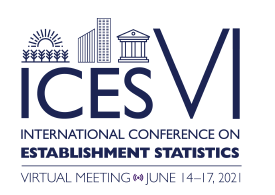All Times ET
Program is Subject to Change
TBD
Synthetic Microdata for Establishment Surveys Under Informative Sampling (307932)
*Jörg Drechsler, Institute for Employment Research, GermanyHang J. Kim, University of Cincinnati
Katherine Jenny Thompson, U.S. Census Bureau
Keywords: disclosure risk, full synthesis, pseudo likelihood, survey weight, synthetic population
Many agencies are currently investigating whether releasing synthetic microdata could be a viable dissemination strategy for highly sensitive data, such as business data, for which disclosure avoidance regulations otherwise prohibit the release of public use microdata. However, existing methods assume that the original data either cover the entire population or comprise a simple random sample from this population, which limits the application of these methods in the context of survey data with unequal survey weights. This paper discusses synthetic data generation under informative sampling. To utilize the design information in the survey weights, we rely on the pseudo likelihood approach when building a hierarchical Bayesian model to estimate the distribution of the finite population. Then, synthetic populations are randomly drawn from the estimated finite population density. We present the full conditional distributions of the Markov chain Monte Carlo algorithm for the posterior inference with the pseudo likelihood function. Using simulation studies, we show that the suggested synthetic data approach offers high utility for design-based and model-based analyses while offering a high level of disclosure protection. We apply the proposed method to a subset of the 2012 U. S. Economic Census and evaluate the results with utility metrics and disclosure avoidance metrics under data attacker scenarios commonly used for business data.
